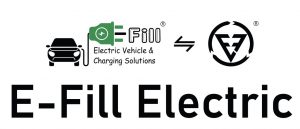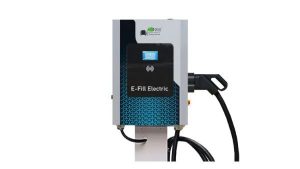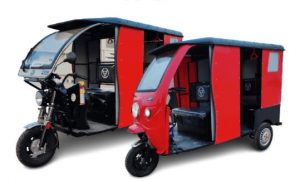E-Fill Electric offers both AC & DC chargers ranging from 3.3kW to 240kW; it has achieved 95 percent localization for AC charger components and over 45 percent for DC chargers, said Mayank Jain, Founder & CEO, E-Fill Electric in an interview with Anurima Mondal, Editor of EVolution Auto India.

Q: Please walk us through the business journey of E-Fill Electric and its crucial achievements.
Mayank Jain: E-Fill Electric was founded in 2019 by Rupak Jha and me. Our initiative was driven by our collective expertise in automotive research and development and a shared passion for sustainable mobility solutions. While researching the EV industry, we recognized India’s pressing need for reliable charging infrastructure and localized e-mobility solutions. The initial foray into the EV space focused on charging solutions. We soon discovered that the existing charging infrastructure was unreliable and underutilized. When we started back in 2019, the charger market was new, and the utilization at that time was low.
Moving forward into 2023 and beyond, E-Fill Electric remains committed to pushing the boundaries of EV charging technology. We continue to innovate with next-generation charging solutions that support ultra-fast charging, bidirectional energy flow, and vehicle-to-grid connectivity, laying the foundation for a smarter and more interconnected electric mobility ecosystem.
Our vision extends beyond borders, as we explore opportunities to replicate our success in international markets and contribute to the global transition towards sustainable transportation solutions. Through relentless innovation and unwavering dedication, E-Fill Electric is shaping the future of electric mobility, driving us toward a cleaner, greener tomorrow.
Q: What types of EV charging solutions do you provide to the customers? What are the USPs?
 Mayank Jain: We offer both AC & DC chargers ranging from 3.3kW to 240kW; we have achieved 95 percent localization for AC charger components and over 45 percent for DC chargers. Our products boast two to three advanced patented features. One recent innovation includes integrating UPI for seamless payment and avoiding the installation of multiple apps. Addressing the inconvenience of multiple applications, our charger integrates directly with UPI payment gateways. Users no longer need to download separate apps or manage multiple wallets, as our charger displays the UPI QR code for payment directly on the screen, a patented feature not found elsewhere in the market
Mayank Jain: We offer both AC & DC chargers ranging from 3.3kW to 240kW; we have achieved 95 percent localization for AC charger components and over 45 percent for DC chargers. Our products boast two to three advanced patented features. One recent innovation includes integrating UPI for seamless payment and avoiding the installation of multiple apps. Addressing the inconvenience of multiple applications, our charger integrates directly with UPI payment gateways. Users no longer need to download separate apps or manage multiple wallets, as our charger displays the UPI QR code for payment directly on the screen, a patented feature not found elsewhere in the market
Q: Kindly share details about E-Fill Electric’s comprehensive suite of charging technologies and state-of-the-art manufacturing facilities.
Mayank Jain: E-Fill Electric takes pride in its cutting-edge manufacturing facilities, over nearly four years; we have dedicated resources to enhance our design, development, infrastructure, and plant facilities. Our technological prowess is evident through a suite of advanced equipment including 3D printers, prototype testing machines, EB simulators, LCR meters, oscilloscopes, and current probes, ensuring precise development and testing processes.
In addition to our robust hardware capabilities, we leverage sophisticated software tools such as SolidWorks, Catia, and Altair for PCB and firmware design, enabling us to stay at the forefront of technological innovation. Our manufacturing operations encompass dedicated assembly lines for three-wheelers and chargers, batch production setups for chargers, and streamlined line production for three-wheelers. Each product undergoes rigorous quality assurance protocols, conducted using in-house EV simulators and various load tests, ensuring that only the highest standards of quality are met before dispatch.
Q: As a tech enthusiast, how has your journey been in the EV charging industry? What are your long-term goals?
Mayank Jain: When we started back in 2019, the charger market was new and the utilization at that time was low. The setback forced us to re-evaluate our approach and explore alternative segments within the EV market. We, then, settled on the Indian e-rickshaw market. Though the industry has been thriving for over a decade, it’s dominated by unorganized players. Also, these players often rely heavily on imported components, leading to issues with quality control and parts availability.
Our Long Term Goals
- Dominate the Indian EV Charging Market
- Become a Global Leader
- Shape the Future of EV Charging Technology
- Promote Sustainable Transportation
Q: The current Indian government has set a target of achieving 30 percent electric vehicle penetration by 2030. What are your views on the EV industry?
Mayank Jain: The Indian EV industry has the potential for significant growth, driven by several factors:
Government Support: The ambitious target of 30 percent EV penetration by 2030 shows the government’s commitment to the sector. Initiatives like FAME II provide subsidies for EV manufacturing and charging infrastructure, making EVs more affordable.
Rising Fuel Prices: The ever-increasing cost of conventional fuel is making EVs a more attractive option for cost-conscious consumers.
Environmental Concerns: Growing awareness about air pollution is pushing people towards cleaner transportation options like EVs.
Technological Advancements: Battery technology is constantly improving, offering greater range and shorter charging times, addressing a major concern for potential EV buyers.
However, there are also some challenges to overcome:
High upfront cost: Electric vehicles, especially four-wheelers, are still more expensive than their gasoline counterparts.
Charging infrastructure: The current charging network is limited, especially for fast charging, which can create range anxiety for potential buyers.
Battery swapping infrastructure: While India has a large market for electric 3-wheelers, a robust battery swapping network is needed to ensure smooth operations for fleet operators.
Grid stability: The increased electricity demand from EVs needs to be managed efficiently to avoid straining the power grid.
Overall, the Indian EV industry is poised for significant growth. Government support, technological advancements, and rising fuel prices are positive tailwinds. However, addressing challenges related to affordability, charging infrastructure, and grid stability will be crucial to achieving the ambitious target of 30 percent EV penetration by 2030.
Q: How, according to you, is digitalization making the EV sector smarter and more efficient?
Mayank Jain: Digitalization is acting as a supercharger for the EV industry, propelling it towards a smarter and more efficient future. On the production side, automation and data analytics are streamlining assembly lines, optimizing processes, and even enabling faster innovation through 3D printing. Supply chains are getting a digital boost too, with improved visibility and route optimization leading to smoother logistics and reduced waste. But the benefits extend far beyond the factory. AI is helping design better EVs with longer ranges, while connected vehicles provide real-time data for remote diagnostics and personalized services. For customers, digitalization means convenient online purchasing, easy charging station access through mobile apps, and even personalized recommendations to optimize their EV experience. In short, digitalization is the secret sauce that will help the EV industry achieve mass adoption and pave the way for a cleaner transportation future.
Q: Is there anything else you want to add to this interaction?
Mayank Jain: Our state-of-the-art manufacturing facilities produce a robust range of AC and DC EV chargers, spanning power outputs from 3.3kW to a powerful 240kW. This ensures they have the perfect charging solution for individuals, businesses, CPOs, OEMs, and fleet operators. E-Fill Electric’s commitment extends beyond manufacturing, as evidenced by its expansive franchise presence across over 25 states and districts in India. They offer both-master and unit franchise opportunities, empowering entrepreneurs to join the EV charging infrastructure movement.

Furthermore, E-Fill Electric carves a unique niche in the EV three-wheeler segment. They are the only company in India to manufacture lithium-ion battery-powered electric three-wheelers, a testament to their dedication to sustainable and efficient transportation solutions.
Innovation is at the core of E-Fill Electric’s success. Their strong R&D team has secured over 7 patents, continuously pushing the boundaries of EV technology. This translates into impressive manufacturing capabilities, with a monthly production capacity of 1300 AC chargers, 290 DC chargers, and a remarkable 300 E-rickshaws and 25000 AC & 4000 DC chargers per annum.
Also E-Fill Electric will serve as a launch partner for DevvStream’s Electric Vehicle Charging Carbon Offset Program (EVCCOP) in India, which aims to accelerate electric mobility by generating revenue for EV charging network owners and operators. The program achieves this by producing and selling voluntary carbon credits, which are generated when EV owners charge their vehicles. The program is tailor-made for Charge Point Operators and Mobility Service Providers that own/operate Level 1, Level 2, or DC Fast Charging stations, public or private, for passenger vehicles or heavy-duty vehicles like e-buses and e-trucks. The average Level 2 EV charger generates approximately 40 credits per year with medium use, while a Level 3 EV charger generates approximately 500 credits annually, according to Company estimates.
By choosing E-Fill Electric, you are partnering with a company at the forefront of the electric mobility revolution. They offer a comprehensive EV ecosystem, from cutting-edge charging solutions to industry-leading three-wheeler technology.